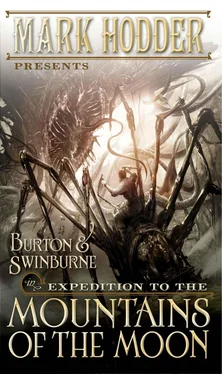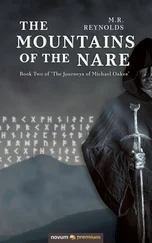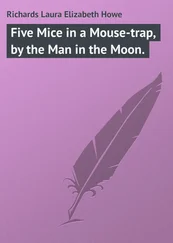Mark Hodder - Expedition to the Mountains of the Moon
Здесь есть возможность читать онлайн «Mark Hodder - Expedition to the Mountains of the Moon» весь текст электронной книги совершенно бесплатно (целиком полную версию без сокращений). В некоторых случаях можно слушать аудио, скачать через торрент в формате fb2 и присутствует краткое содержание. Жанр: sf_stimpank, на английском языке. Описание произведения, (предисловие) а так же отзывы посетителей доступны на портале библиотеки ЛибКат.
- Название:Expedition to the Mountains of the Moon
- Автор:
- Жанр:
- Год:неизвестен
- ISBN:нет данных
- Рейтинг книги:5 / 5. Голосов: 1
-
Избранное:Добавить в избранное
- Отзывы:
-
Ваша оценка:
- 100
- 1
- 2
- 3
- 4
- 5
Expedition to the Mountains of the Moon: краткое содержание, описание и аннотация
Предлагаем к чтению аннотацию, описание, краткое содержание или предисловие (зависит от того, что написал сам автор книги «Expedition to the Mountains of the Moon»). Если вы не нашли необходимую информацию о книге — напишите в комментариях, мы постараемся отыскать её.
Expedition to the Mountains of the Moon — читать онлайн бесплатно полную книгу (весь текст) целиком
Ниже представлен текст книги, разбитый по страницам. Система сохранения места последней прочитанной страницы, позволяет с удобством читать онлайн бесплатно книгу «Expedition to the Mountains of the Moon», без необходимости каждый раз заново искать на чём Вы остановились. Поставьте закладку, и сможете в любой момент перейти на страницу, на которой закончили чтение.
Интервал:
Закладка:
“I arrived in 1914. It's now 1918.”
“My hat! Really?”
The flower angled upward as if regarding the sky.
“One and two are not one; but one and nothing is two;
Truth can hardly be false, if falsehood cannot be true.”
It turned back to the two men.
“I find it rather difficult to measure time these days. I've had such a different sense of it since I-er-took root, so to speak. It's not at all the way I used to think of it. Can you conceive of time as a thing filled with paradoxes and echoes? What a magnificent poem it would make!
“Once the mastodon was; pterodactyls were common as cocks;
Then the mammoth was God; now is He a prize ox.
“Parallels all things are; yet many of these are askew;
You are certainly I; but certainly I am not you.
“Springs the rock from the plain, shoots the stream from the rock;
Cocks exist for the hen; but hens exist for the cock.
“God, whom we see not, is; and God, who is not, we see;
Fiddle, we know, is diddle, and diddle, we take it, is dee.”
Swinburne arched his thick stalk and shook with a peal of high-pitched laughter. Leaves drifted down from his higher branches.
Wells leaned close to Burton and whispered, “I'm of the opinion that your friend, the giant plant, is rip-roaringly drunk!”
The explorer appeared not to hear the little war correspondent. “Vertical as well as horizontal qualities,” he mumbled to himself. “Who else spoke to me about the nature of time?”
Swinburne loosed a sound that resembled a belch and directed his petals back at Burton.
“But for all my newfound perception,” he said, “upon your appearance, I instantly recognised that you weren't where-or, rather, when -you belong; and I certainly didn't relish the thought of you being out there, beyond the mountains, among the savages.”
“Actually, there aren't many left,” Wells put in. “Most of those that remain are Askaris now.”
Swinburne gave a scornful hiss. “I'm not referring to the Africans, Mr. Wells. I mean the Europeans!”
“Ah. Quite so.”
“The barbarities that have been committed on this continent in the name of one ideology or another, this social policy or that-quite dreadful! And I mean to put an end to it. I shall soon have the strength to make the German vegetation-the red weed and the venomous plants-whither and die. Already I've gained influence over those horrible things the Prussians once employed as vehicles-”
Wells cried out: “Then it was you! You took control of the lurchers! You cleared the route out of Tabora for us!”
“Is that what you call them? Yes, of course it was me. Now I shall use them to rid this land of its armies. My influence is growing, Mr. Wells. My roots will one day reach from coast to coast. And when they do, I shall make a Utopia of Africa!”
“Utopia!” Wells's eyes glistened with hope.
“For as long as this version of history exists, Africa will be an Eden.”
The flower bobbed low, until it was level with their faces.
“But,” it squeaked, “this history should not exist. You have to go back, Richard, and you have to put an end to all such divergences.”
Bertie Wells frowned and looked from the vermillion blossom to Burton and back again. “Mr. Swinburne,” he said, “Richard has explained the phenomenon of alternate histories to me. Why can they not exist concurrently?”
“Time is a complex thing. It is like music. In addition to its rhythm, there is-”
“A melody,” Burton interjected. “Refrains, pitch, timbre, and texture. Time has harmonies, volume, accents, and pauses. It has verses and-Bismillah! I've heard this before-from-from Herbert Spencer!” He looked confused. “But not Herbert Spencer.”
“Good old tin-head!” Swinburne exclaimed. “I wonder what became of him?”
Burton pointed to where Swinburne's hollow root blocked the cave mouth. “He's in there!”
“I say! Is he? Was he then involved in your transportation here?”
The explorer struggled for an answer. Something felt very wrong. The clockwork philosopher had been a friend and ally, yet, for reasons he couldn't determine, when he thought of him now, he felt threatened and distrustful. “He was,” he said, and immediately felt he'd uttered an untruth.
“Then you must go to him,” Swinburne said. “And he must return you to 1863. For, to answer Mr. Wells's question, these alternate histories are proliferating and turning time into a cacophony. Imagine ten orchestras playing different tunes in the same theatre. The musicians would lose their way. Some would play the wrong melody by mistake. Musical expressions would be misplaced and mixed up. There'd be pandemonium. And that is what's happening. If this situation is allowed to continue unchecked, the borders between each version of reality will be breached. Diverse technologies will become horribly intermingled. People's personalities will be bent entirely out of shape. Events will develop in increasingly eccentric directions.”
“But how can I reverse the damage?” Burton asked.
“I haven't a clue! I'm just a poet! But you'll find a way.”
The king's agent looked at the opening in Swinburne's root. He didn't want to enter the cave; didn't want to see the grotto or the temple; and, especially, he didn't want to see Herbert Spencer.
He noticed a flower-strewn mound. It looked like a grave. The back of his mind seemed to flex, as if to divulge a secret, but the information didn't come-only deep sadness.
He addressed Wells: “Algy is right, Bertie. And that means I have to leave you now. I have to enter the temple.”
“I'm coming with you.”
“There's no need, and it might be dangerous.”
“I've seen this thing through with you from the start. I need to be there at the finish.”
Burton considered a moment, then nodded.
“Algy,” he said, turning back to the vermillion blossom. “I'm sorry this happened to you.”
“Sorry?” the poet responded. “Don't be sorry! This is everything I could have hoped for! My senses are alive , Richard! And what senses! I've never felt so engaged with life! So intoxicated by it! Finally, I feel the inexpressible poetry of sheer being! It's wondrous!”
Burton reached up and placed a hand on the side of the flower. “Then I'm happy for you, my friend.”
Swinburne's petals squeezed into a pucker, and the flower slid forward and placed a dewy kiss on the explorer's forehead.
Drawing away, Swinburne said, “Off you go.”
Burton reached up to his vehicle's saddle and lifted down his rifle. Seeing this, Wells stepped back to his harvestman and did the same. They walked together across the glade to the opening in the plant's root.
The king's agent looked back. The huge red flower had risen up into the sunbeam. Its petals were open. A trio of butterflies danced around it. He smiled and moved into the hollow limb.
Swinburne whispered:
“A wider soul than the world was wide,
Whose praise made love of him one with pride,
What part has death or has time in him,
Who rode life's lists as a god might ride?”
Sir Richard Francis Burton and Herbert George Wells walked through the hollow root and down into the grotto. They stepped out of an opening in the limb, crossed the chamber, and wriggled through the narrow tube in its wall to the shelf overlooking the vast cavern. After following the path down, they were met by the Batembuzi, who shepherded them to the Temple of the Eye.
The war correspondent gazed in disbelief at the monolithic edifice. “By gum,” he said. “It dwarfs even the pyramids!” He glanced nervously at their escorts. “It's funny, though-I always imagined that it'd be the workers who ended up as troglodytes, rather than the priests.”
Читать дальшеИнтервал:
Закладка:
Похожие книги на «Expedition to the Mountains of the Moon»
Представляем Вашему вниманию похожие книги на «Expedition to the Mountains of the Moon» списком для выбора. Мы отобрали схожую по названию и смыслу литературу в надежде предоставить читателям больше вариантов отыскать новые, интересные, ещё непрочитанные произведения.
Обсуждение, отзывы о книге «Expedition to the Mountains of the Moon» и просто собственные мнения читателей. Оставьте ваши комментарии, напишите, что Вы думаете о произведении, его смысле или главных героях. Укажите что конкретно понравилось, а что нет, и почему Вы так считаете.












